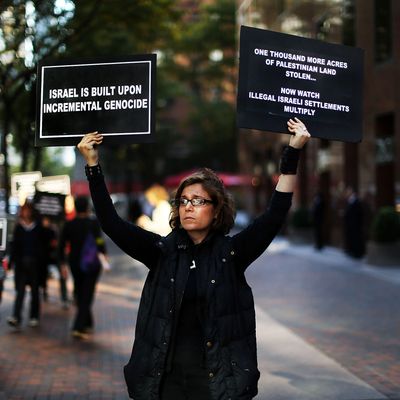
Yesterday, Senators Bob Casey and Tim Scott introduced the Anti-Semitism Awareness Act, a bipartisan bill aimed at tackling campus anti-Semitism. There appear to have been a recent, distressing increase in the prevalence such incidents — as the bill’s press release points out, the Anti-Defamation League “found that the number of anti-Semitic attacks at colleges and universities doubled in 2015” as compared to the year prior, with incidents ranging from physical assaults to swastika graffiti.
At first blush, the bill sounds like a straightforwardly good thing: “This legislation will help the Department of Education investigate incidents of discrimination motivated by anti-Semitism in our schools, which should be safe environments for students from all backgrounds,” explains Casey in the release. The text of the bill doesn’t appear to be posted yet, but based on that quote, who could be against it?
The problem is, when you wade a bit into the weeds of what Casey and Scott and proposing (hat tip to Reason for doing so), glaring free-speech problems arise. The press release explains that the bill seeks to codify into U.S. law the definition of anti-Semitism used by the State Department’s Special Envoy to Monitor and Combat Anti-Semitism, which reads: “Anti-Semitism is a certain perception of Jews, which may be expressed as hatred toward Jews. Rhetorical and physical manifestations of anti-Semitism are directed toward Jewish or non-Jewish individuals and/or their property, towards Jewish community institutions and religious facilities.” Both the State Department and the European Union use that definition to help track the prevalence of anti-Semitism around the world. Then, the press release cites specific examples of anti-Semitic speech and acts:
-Calling for, aiding, or justifying the killing or harming of Jews
-Accusing the Jews as a people, or Israel as a state, of inventing or exaggerating the Holocaust
-Demonizing Israel by blaming it for all inter-religious or political tensions
-Judge [sic] Israel by a double standard that one would not apply to any other democratic nation
Three of the four items on that list are firmly protected by the First Amendment (explicitly calling on people to kill Jews could of course constitute a criminal threat). And the press release offers incredibly mixed messages on that front. First, it explains that the bill’s goal is to “ensure the U.S. Department of Education (DOE) has the necessary statutory tools at their disposal to investigate anti-Jewish incidents.” Then, after listing the above examples, the release cautions that “This act is not meant to infringe on any individual right protected under the First Amendment of the Constitution.”
Those two claims — this bill will be used to help the government investigate anti-Semitic incidents, and this bill won’t be used to quash speech rights — don’t go together. The government cannot constitutionally punish someone for engaging in protected speech, and shouldn’t be “investigating” such speech. Holocaust denial is gross, but it’s definitely protected speech. As for the other, non-criminal-threat examples, imagine the reaction if if two senators introduced a bill to better equip a government agency to monitor and respond to instances in which Americans said or wrote things that “demonized” the U.S. or “held it to a double standard” for causing the world’s miseries. There would be an uproar, and justifiably so. The same logic should apply here.





























